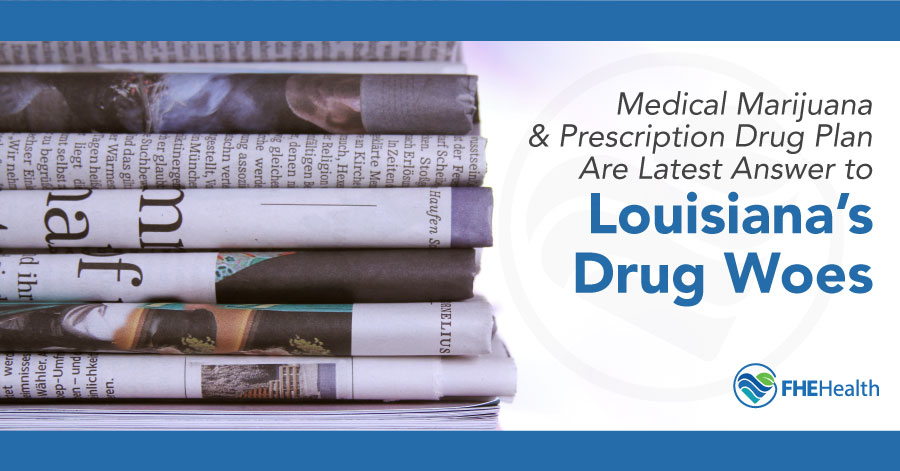
Drug smugglers have been known to take incredibly dangerous—some would say foolish—risks to meet the demand for their illicit drugs and make a profit in doing so. Smugglers have hidden drugs in the cargo holds of their planes and boats. They’ve hidden them in shipments of products like toys and pottery, attempting to smuggle them across international borders….
The latest attempt happened in Louisiana, when drug dealers attempted to smuggle their goods past armed patrols into the state penitentiary in Angola. While the large-scale drug smuggling operation was busted, it illustrates the lengths that some individuals are willing to go to deal drugs. State officials hope that with the adoption of medical marijuana in Louisiana and its new prescription drug plan, it can lessen the demand for illegal drugs and lead to a decrease in the need for people to commit serious crimes.
Meth and Cocaine Bust at the Louisiana State Penitentiary
In recent news, The Advocate reported, “A federal grand jury indicted nearly two dozen people accused of smuggling large amounts of drugs into the Louisiana State Penitentiary at Angola.” A total of 22 people, including five prison guards, were indicted for smuggling cocaine, methamphetamine, and marijuana into the prison. The Louisiana State Penitentiary is the state’s largest prison, and authorities are calling the drug smuggling operation “large-scale.” Authorities did not release the amount of substances smuggled into the prison, but they did note how brazen the dealers were; they reportedly spoke openly on prison phones about shipments and plans for getting packages of illicit and prescription drugs into the facility.
Risk and Profit
The Angola prison arrests illustrate just how willing some people—even prison guards and staff—are to take extraordinary risks to make money. These were not the first prison guards in the state to face indictments on drug-trafficking charges either. It’s common knowledge that the leaders of illicit drug operations make obscene profits, but the people on the ground, the ones making the pick-ups and drop-offs—those taking the risks on the streets—do not make such profits. Some are simply dealing to feed their own drug addictions. Others are lured by the high demand that exists on the streets for drugs.
Medical Marijuana
In Louisiana, medical marijuana is now approved for the treatment of various health conditions, including many debilitating and painful diseases. Many state officials and healthcare providers are hopeful that medical marijuana can act as a replacement for some of the more addictive medications like opioid painkillers. Marijuana can be addictive, but it’s not at the same level as harder drugs like heroin and Fentanyl.
Addiction to opioids is at epidemic proportions. When those addicted to opioids can’t get them from their healthcare providers, they often turn to the streets, feeding the drug problem and worsening the epidemic while injuring their own mental and physical health. Medical marijuana may help alleviate some of the suffering people endure, while helping to tamp down on the risk for addiction development.
Pharmaceutical Company Subscription Plans
Louisiana is taking a novel approach to healthcare that could ultimately impact people suffering from serious and debilitating health conditions. According to The Washington Times, “The state will pay $60 million a year over the next five years to gain unlimited supplies of a cure for hepatitis C. With a goal of serving 80% of its infected residents, Louisiana began treating its first patients under the subscription plan last week. If the subscription model works, it could serve as a national model for reducing the costs of drugs. In the fight to curb substance addiction, this could impact many who have been turning to the street for drugs to alleviate their pain or other debilitating health symptoms.
Squaring Off against the Prescription and Illicit Drug Problem
Meanwhile, the National Institute on Drug Abuse reported that “in 2017, there were more than 70,200 drug overdose deaths in the U.S.–an age-adjusted rate of 21.7 per 100,000 persons. Among these, 47,600 involved opioids.” The state’s officials and medical community feel that multiple measures are needed to reduce the severity of the crisis in the state. Those 2017 statistics represent a 12 percent increase, demonstrating that the drug epidemic in Louisiana has been worsening—not getting better. Only time will tell whether measures like medical marijuana and prescription subscription plans really will reduce these numbers in the longer run.
Individualized Treatment at FHE Health
States often talk about the drug epidemic in terms of statistics. When describing overdose rates, people become numbers, each one part of the percentage. But in real life, nobody is a statistic: any person who suffers from addiction has unique and individualized treatment needs. FHE Health provides customized treatment to people who are addicted to alcohol, prescription drugs, and/or illicit drugs. Our center takes a multi-faceted approach to treating substance addictions, targeting each aspect of the disease including its physical and psychological dimensions.
Substance addiction may not be curable, but it can be successfully managed. With high-quality treatment, you can achieve long-term sobriety and recovery. If you or a loved one is struggling with addiction, contact FHE Health for a free consultation and to jumpstart your recovery.






